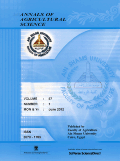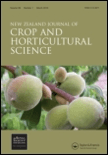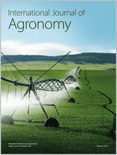
Pesquisa Agropecuaria Tropical
Scope & Guideline
Driving excellence in agricultural science since 1971.
Introduction
Aims and Scopes
- Crop Production and Management:
Research on various aspects of crop production, including the effects of different fertilization strategies, irrigation practices, and planting methods on yield and quality of crops. - Plant Physiology and Biochemistry:
Studies investigating the physiological responses of plants to environmental stressors, nutrient availability, and chemical treatments, enhancing understanding of plant growth and development. - Pest and Disease Management:
Focus on integrated pest management strategies, including the use of biological control agents and chemical treatments to mitigate pest and disease impacts on crops. - Sustainable Agriculture Practices:
Research promoting sustainable agricultural practices, including organic farming, cover cropping, and the use of bioinputs to enhance soil health and crop resilience. - Genetic Diversity and Breeding:
Exploration of genetic diversity in crops and wild relatives, with an emphasis on breeding strategies aimed at improving crop traits such as yield, disease resistance, and stress tolerance. - Environmental and Ecological Studies:
Investigations into the ecological impacts of agricultural practices, including studies on soil health, biodiversity, and the effects of climate change on agricultural productivity.
Trending and Emerging
- Sustainable and Organic Practices:
Research on sustainable and organic agricultural practices is gaining momentum, highlighting the importance of reducing chemical inputs and enhancing soil health. - Climate Change Adaptation:
Emerging studies are focusing on how agricultural systems can adapt to climate change, including research on drought-resistant crops and climate-smart agricultural practices. - Use of Technology in Agriculture:
There is a growing trend towards incorporating technology, such as artificial intelligence and precision agriculture techniques, to optimize resource use and improve productivity. - Soil Health and Microbiome Studies:
Increased attention is being given to soil health and the role of soil microbiomes in enhancing plant growth and resilience, reflecting a shift towards understanding the soil ecosystem. - Agroecological Approaches:
Research promoting agroecological practices, which integrate ecological principles into agricultural systems, is on the rise, emphasizing biodiversity and ecosystem services.
Declining or Waning
- Traditional Chemical Fertilizer Studies:
Research focused solely on traditional chemical fertilizers is becoming less prominent, as there is a growing emphasis on sustainable practices and organic alternatives. - Single Crop Studies:
Studies concentrating on single crops without considering agroecological interactions are declining, reflecting a shift towards more integrated approaches that consider crop rotations and intercropping. - Conventional Pest Control Methods:
The focus on conventional chemical pest control methods is waning in favor of integrated and organic pest management solutions, which are increasingly prioritized for their environmental benefits. - Static Genetic Studies:
Research that does not incorporate modern genetic techniques or fails to explore adaptive traits in the context of climate change is becoming less frequent, as there is a push for more dynamic and applied genetic research. - Non-ecological Approaches to Crop Management:
There is a noticeable decline in studies that do not take into account ecological principles in crop management, as the agricultural community increasingly recognizes the importance of sustainable practices.
Similar Journals

ANNALS OF AGRICULTURAL SCIENCES
Exploring Innovations that Cultivate Tomorrow's SolutionsANNALS OF AGRICULTURAL SCIENCES, published by Elsevier, stands as a leading open access journal dedicated to the multifaceted field of agricultural sciences. Since its inception in 2011, this journal has served as a pivotal platform for the dissemination of high-quality research, covering areas such as agronomy, animal science, horticulture, food science, plant science, and soil science. With an impressive Q1 ranking across multiple disciplines and notable positions in Scopus Ranks—including #6 in Animal Science and Zoology and #3 in Horticulture—this journal is recognized globally for its significant contribution to advancing agricultural innovations. The journal caters to a diverse audience of researchers, professionals, and students, providing them with open access to cutting-edge studies that address critical issues in agricultural productivity and sustainability. Its commitment to high-impact research ensures that articles contribute meaningfully to the scientific community, fostering advancements in agricultural practices and policies.

NEW ZEALAND JOURNAL OF CROP AND HORTICULTURAL SCIENCE
Exploring Innovations in Agronomy and HorticultureThe New Zealand Journal of Crop and Horticultural Science, published by Taylor & Francis Ltd, stands as a key resource in the fields of Agronomy and Horticulture, with a commendable impact factor reflecting its quality and influence in the scientific community. Since its inception in 1989, this journal has been committed to advancing our understanding of crop development and horticultural practices, catering not only to researchers and professionals but also to students eager to delve into the intricacies of plant sciences. With a Q3 ranking in both Agronomy and Crop Science and Horticulture as of 2023, the journal occupies a significant position within the agricultural and biological sciences domain, significantly contributing to the body of knowledge in these fields. The journal features original research, reviews, and technical notes that cover a wide range of topics, ensuring a comprehensive perspective on contemporary and emerging agricultural issues. For individuals interested in accessing cutting-edge research, the journal provides subscription-based access, further enhancing its scholarly contributions.

Agrivita
Unveiling the future of agriculture through open-access research.Agrivita is a distinguished, open-access journal dedicated to advancing research and knowledge in the fields of Agronomy and Crop Science. Published by Brawijaya University, Faculty of Agriculture, this journal has been providing a platform for high-quality scholarly articles since 2010. Located in the vibrant country of Indonesia, Agrivita plays a vital role in the exchange of innovative agricultural research, particularly within the Southeast Asian context. As of 2023, it holds a respectable Q3 ranking in its category, showcasing its commitment to scholarly excellence and visibility. With an increasing impact on the academic community, and its current Scopus rank placing it in the 48th percentile, Agrivita stands as a crucial resource for researchers, professionals, and students eager to deepen their understanding of crop science and agronomy. The journal's scope encompasses cutting-edge research that addresses both fundamental and applied aspects of agriculture, ensuring it remains relevant to today's pressing agricultural challenges. Its open access model enhances global accessibility, fostering a collaborative environment where diverse opinions and findings can converge.

Agronomy-Basel
Advancing Agricultural Practices Through Open Access ResearchAgronomy-Basel is a leading international journal dedicated to advancing the field of agronomy and crop science, published by the respected MDPI. Since its inception in 2011, this open-access journal has provided a vital platform for the dissemination of high-quality research, featuring innovative studies and reviews that contribute to the understanding of agricultural practices and crop management. With an impressive impact factor and ranked in the Q1 quartile of its category for 2023, Agronomy-Basel has established itself as a premier resource in the realm of Agricultural and Biological Sciences, achieving a commendable rank of #62 out of 406 in its field, placing it in the 84th percentile. The journal targets researchers, professionals, and students who are dedicated to enhancing agricultural sustainability and productivity. Located in Basel, Switzerland, the journal's commitment to open access empowers global accessibility to flourishing agricultural advancements, thus fostering collaboration and innovation across the globe.

INDIAN JOURNAL OF AGRICULTURAL SCIENCES
Exploring the frontiers of agronomy and crop science.Welcome to the Indian Journal of Agricultural Sciences, a vital resource for researchers and professionals in the field of agricultural sciences, published by the esteemed Indian Council of Agricultural Research. Established in 1974, this journal aims to disseminate high-quality research and developments in agronomy and crop science, facilitating knowledge exchange and advancement within the agricultural community. Though currently classified in the Q4 category according to 2023 data, it provides an essential platform for publication, contributing valuable insights towards sustainable agricultural practices. With an ISSN of 0019-5022 and an E-ISSN of 2394-3319, the journal houses important research that spans decades of convergence and collaboration, promoting innovation in agriculture across India and beyond. As an open access platform, it invites contributions that reflect a wide array of agricultural disciplines to foster sustainable food systems that address the challenges of food security. Join the network of scholars and practitioners by sharing your research and engaging with the profound work being done in this transformative field.

Revista Brasileira de Ciencias Agrarias-Agraria
Advancing agricultural knowledge for a sustainable future.Revista Brasileira de Ciencias Agrarias-Agraria is an esteemed academic journal published by the Universidade Federal Rural de Pernambuco, dedicated to advancing the field of agricultural and biological sciences. With a focus on disseminating high-quality research, this journal plays a pivotal role in fostering knowledge exchange within the agricultural community, particularly in Brazil and beyond. As a Q3 ranked publication in the Agricultural and Biological Sciences category, Revista Brasileira de Ciencias Agrarias-Agraria contributes to the growing body of literature by featuring insightful articles from both emerging and established researchers in the field. The journal has been consistently published since 2011 and is committed to open access principles, ensuring that research findings are accessible to a wide audience. Researchers, professionals, and students will find this journal an invaluable resource for deepening their understanding of current trends and innovations in agriculture.

International Journal of Agronomy
Cultivating Knowledge to Transform AgronomyIntroducing the International Journal of Agronomy, an influential publication in the field of agricultural sciences, established by HINDAWI LTD. With an impact factor that reflects its relevance and quality, this journal has been an essential resource for researchers and professionals since its shift to Open Access in 2009, facilitating widespread dissemination of knowledge. Based in the United States, the journal has achieved notable recognition within the academic community, currently ranked in the Q2 quartile among Agronomy and Crop Science, with an impressive Scopus Rank of #139 out of 406 in its category, representing the top 65th percentile. Spanning from 2013 to 2024, it aims to advance the understanding and innovation in agronomy through its rigorous peer-reviewed research articles, reviews, and case studies. With a commitment to enhancing global agricultural practices and sustainability, the International Journal of Agronomy stands as a vital platform for sharing cutting-edge findings that ultimately contribute to the advancement of the agronomic sciences.

Revista de Agricultura Neotropical
Connecting Researchers to the Heart of AgricultureRevista de Agricultura Neotropical, published by UNIV ESTADUAL MATO GROSSO SUL, serves as a pivotal platform for disseminating research in the fields of agronomy and crop science. Since its inception as an open-access journal in 2014, it has been dedicated to promoting innovative research and practical applications within the agricultural sector, specifically tailored to the challenges and dynamics of the tropical agriculture landscape in Brazil and beyond. Although currently positioned in the Q4 quartile of Scopus rankings, and with a modest agricultural science percentile, the journal actively encourages contributions that highlight sustainable agricultural practices, tropical crop management, and emerging technologies in farming. With its commitment to open access, the Revista de Agricultura Neotropical broadens the reach of critical knowledge, making it accessible to researchers, professionals, and students alike, thus fostering a collaborative environment for advancing agri-scientific initiatives.

Zemdirbyste-Agriculture
Fostering global discourse on food security and environmental health.Zemdirbyste-Agriculture is a prominent journal dedicated to advancing the field of agricultural sciences, with a particular focus on agronomy and crop science. Published by the Lithuanian Research Centre Agriculture & Forestry, this open access journal has been fostering knowledge sharing and scientific discourse since 2004, allowing researchers, professionals, and students unrestricted access to its content. Located in the beautiful country of Lithuania, specifically at Vytautas Magnus University, this journal plays a significant role in disseminating innovative research findings. With a 2023 Scopus ranking of #246 out of 406 in the category of Agricultural and Biological Sciences, Zemdirbyste-Agriculture falls within the Q3 quartile, reflecting its growing influence in the academic community. This journal, which has converged its publication focus from 2008 to 2023, aims to provide a platform for scientists to share their critical insights on agricultural practices, sustainability, and technological advancements in crop science, thereby contributing to the global discourse on food security and environmental health.

Legume Research
Cultivating Knowledge for Sustainable Legume SolutionsLegume Research, published by the AGRICULTURAL RESEARCH COMMUNICATION CENTRE in India, is an essential peer-reviewed journal focusing on advancements in the field of agronomy, crop science, soil science, and plant science. With an ISSN of 0250-5371 and operating since 2008, this journal caters to researchers, agricultural professionals, and students interested in the critical role of legumes in sustainable agriculture and food security. It ranks within the third quartile (Q3) in several prominent categories, reflecting its contribution to the agricultural and biological sciences community—ranking #279 in Agronomy and Crop Science, #113 in Soil Science, and #376 in Plant Science based on Scopus metrics. Although not open access, Legume Research remains a vital resource for those seeking to enhance their knowledge and contribute novel research findings in the ever-evolving discipline of legume cultivation and utilization. With a clear objective to disseminate impactful research, this journal significantly contributes to the global understanding of legumes' ecological, economic, and nutritional importance.